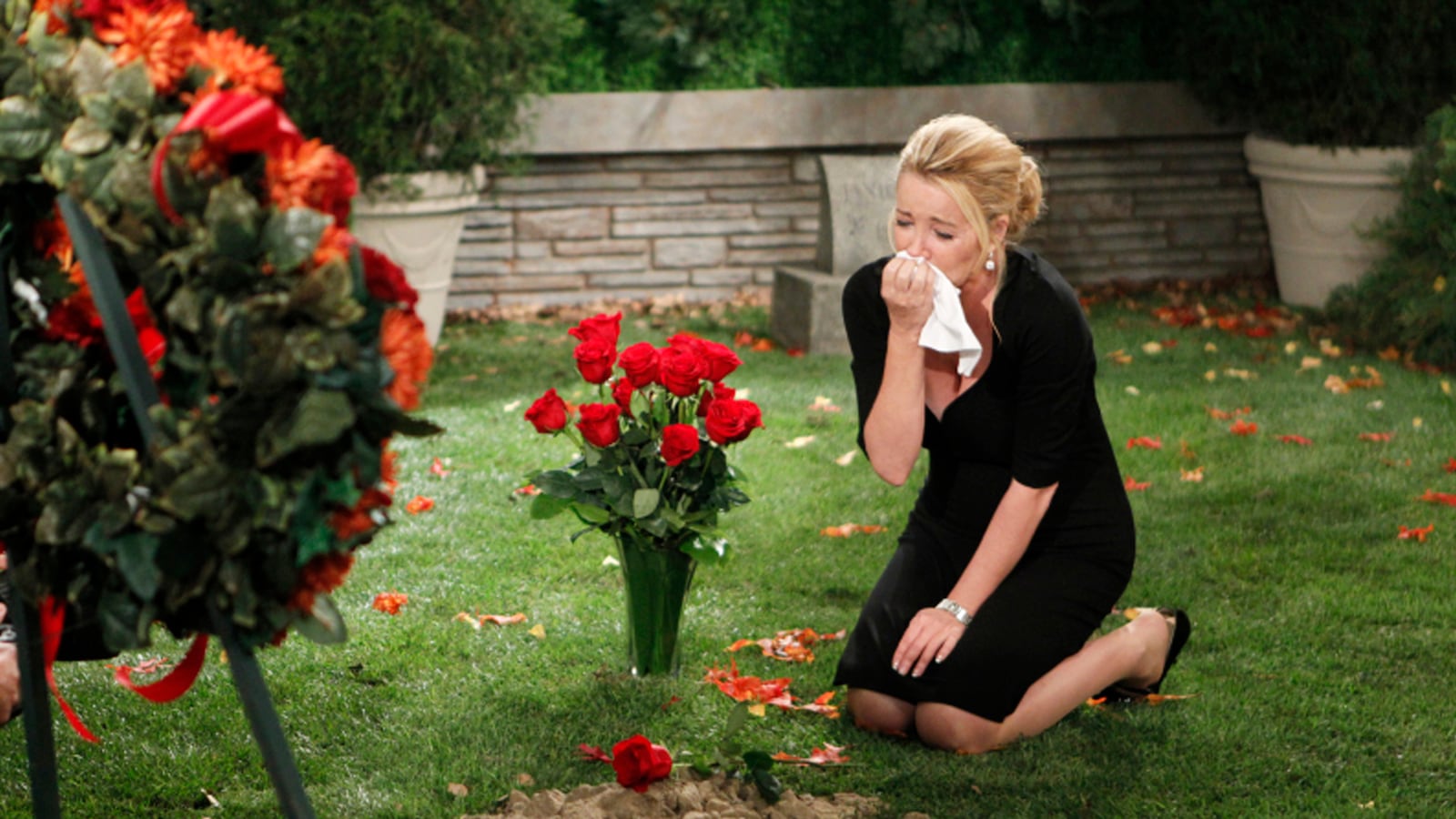In a world of tremulous crescendos and lip-quivering fadeouts, every day is stressful and confusing (in the best possible ways) for fans of The Young and The Restless, the number one daytime soap opera. Why does Sharon’s dead daughter Cassie keep appearing from nowhere to counsel her to reunite with her ex, Nick, and encouraging her mother to conceal that she pushed her rival Phyllis down some stairs and into a coma? Is Cassie an apparition produced by Sharon’s mental instability, or a cloned Cassie? Clones and doubles are a dime a dozen in daytime. YnR (as it's known) fans will recall that in 2010, Sarah, the sister of uber-villainess Sheila, had significant plastic surgery to look like Sheila’s nemesis Lauren, and kept her in a cage for weeks. It ended, magnificently, in a shoot-out between the women in a fairground hall of mirrors.

Today, another shattering climax will erupt on YnR: after months of agonizing wait, we will finally find out if and how good-flawed Billy will take revenge on reformed-devil-incarnate Adam for killing Billy’s daughter Delia months ago. The two men have been rumbling at each other all week, leading to today’s big finale and the controversial departure of both actors, Michael Muhney (Adam) and Billy Miller (Billy), from the show. This has left fans unsurprisingly furious, as, despite its title, the only characters you care about are the older and the restless; they are by leagues the better actors, too.
Muhney’s departure is particularly controversial, as it comes after allegations he groped a young actress on the show. Fans have taken to the skies to seek his reinstatement; others have stated their support for the actress. Billy the character will return, but he will be played by a different actor; the fate of Adam is a mystery.
Despite this off-screen drama, YnR is—like the three other surviving daytime soaps on air—celebrating the news that it has been renewed. Not only that, the audiences for YnR, The Bold and The Beautiful (both CBS), Days of Our Lives (NBC) and General Hospital (ABC) have not just held steady, they have increased.
This statement of rude health is in stark contrast to the death knells sounded for the genre after the cancellations of Guiding Light (2009), As The World Turns (2010), All My Children (2011), and One Life To Live (2012). The prediction was that it was only a matter of time before the rest of the dominoes fell, and daytime schedules would be wall-to-wall chat—with soaps, long-ridiculed for their absurdity and antiquity, and far too expensive to make, consigned to the broadcast graveyard.
In fact, The Bold and The Beautiful and General Hospital will be continued through the 2014/2015 season, Days of Our Lives through November 2016, and The Young and The Restless until 2017. The latter, which has been the number one daytime drama for 25 consecutive years, is averaging 5.17 million viewers, up 9 percent from last season. The Bold and The Beautiful is averaging 3.90 million viewers, up 14 percent from last season.
General Hospital reportedly averages 3.3 million viewers, up 8 percent from last season (ABC did not return enquiries for comment), while Days of Our Lives, which will next year celebrate its 50th birthday, has seen its audience increase by 10 percent. All shows have increased their share in the core audience demographic of women aged 18-49.
It’s the best soap arc itself: from the jaws of death—the number of daytime soaps on air has shrunk from 12 in 1998 to 4 today—to vivacious life, with the current quartet commanding impressive audiences and fierce loyalty.
“Soaps are thriving,” says Angelica McDaniel, Senior Vice President, CBS Daytime. “You can see that in primetime too, with the success of shows like Scandal, Revenge and the return of Dallas.” Stephanie Sloane, Editorial Director of Soap Opera Digest magazine, and a lifelong soap fan, who recalls the heady days of “supercouple” Luke and Laura’s wedding (after he raped her) in General Hospital in 1981, says one significant factor is that viewers left bereft after the cancellation of a favorite show have migrated en masse to one of the four survivors. To help fans grieving One Life To Live in particular, ABC has thoughtfully exported many of the core cast to General Hospital.
“The predictions of the death of the daytime soap were greatly exaggerated,” Sloane says. “People still want to see storytelling in daytime. The cancellation of the other shows might have made people think that no show was safe, so they have passionately turned out—and daytime soap opera fans are the most passionate fans of any TV genre—to support these shows, to keep them on air. Soaps are the only place where you can see this dramatic kind of storytelling on air every day, all year round.”
As for the much cheaper-to-make chat shows, which have come in the cancelled soaps’ wake, Sloane says diplomatically: “Some have worked, some have not. I don’t think viewers love all of the chat, I think they love some of the chat.” Two cancelled shows, One Life To Live, and All My Children, have had problematic and none-too-successful rebirths online, now mired in legal wrangling.
To retain fans, the remaining TV soaps have become faster, to match—as Sloane puts it, “Everyone’s lives getting faster.” They are available on many tech-platforms, as viewers watch them live during the day less and less. Twitter and other social media have stoked fan loyalty, Sloane says. “Whereas before you may have talked about a show with a friend, now you can exchange views with thousands of others online in message boards and forums,” she says. General Hospital has bought back many old, familiar characters for its 50th anniversary, “which is also nice for viewers,” Sloane says. “It tells them, ‘If you return to us, you’ll see people you remember and used to love watching.”
Days of Our Lives’ renaissance has been bolstered by storylines featuring one of the show’s most popular villainesses, Kristen DiMera (Eileen Davidson), who in her latest carnival of destruction drugged and raped a priest. She left the show, but in a sage nod to a golden egg, the producers just announced that she will return to Salem, just as they announced the departure of veteran Alison Sweeney, who played bad-girl-turned-trauma-beset-diva Sami Brady.
Anything goes in daytime. Sloane says you can attach any wild story on to characters—not piled high in multiples, or the whole thing topples—“because people want to watch those characters, who they have watched for years, deal with it.” That loyalty meant Days writers could in the 1990s memorably make Dr. Marlena Evans demonically possessed—bulging eyes, levitation and all.
Whatever controversy erupts over actors’ sackings, favorite actors moving on, or characters being axed, McDaniel (who will not comment on Muhney’s or Miller’s exits specifically) is firm that such brouhahas will not sink or harm her shows. “The Young and The Restless is the star of the show. That’s why the fans have stuck with us for 40 years: they know the dynamics of good characters and good story.”
Beyond the bright, short-term futures of this hardy band of survivors in a bespoke genre, what can be guaranteed? “You can’t take anything for granted, or you get stuck,” McDaniel says. “I just implore fans and viewers to support these shows. The truth is, the longer they support them, the longer they’ll stay on the air.”
“As long as the writers and producers keep it fresh,” Sloane says, the future of daytime soaps is secure. “The thing is, people like to be told stories, and daytime is one of the few places where they can hear them every day.”
Sloane means, correctly, that daytime soaps are not just loved; they are unique. From seeming like the cheap option for so many years, daytime soaps are now the last defense against hours of continuous white noise and shrieking voices sitting around tables recycling views about the Kardashians, Real Housewives, and Justin Bieber. For that brave function alone, daytime soaps should not just be treasured—they should be fought for.






